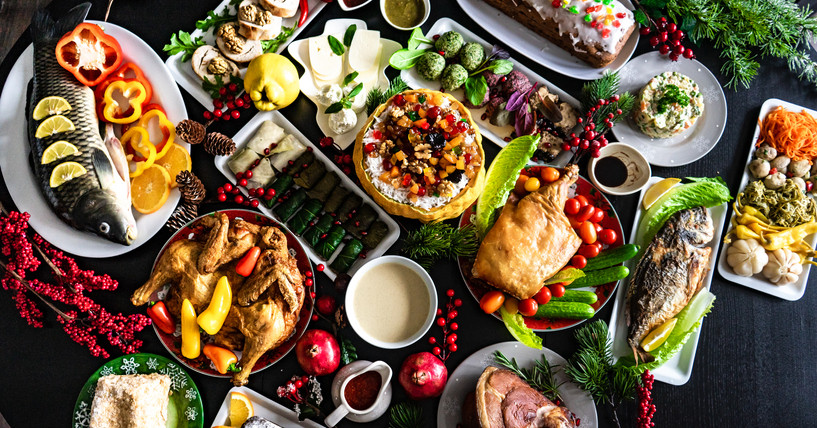Jump-start a healthier New Year with four holiday eating tips
Satisfying strategies to adopt during a season of festive food.

Many people wait until January 1st to begin eating healthier. After all, the holidays are full of stress and extra helpings of rich festive foods, so why bother?
But banish that negative thought, because this is an ideal time to adopt new habits. "The dietary changes you make now can help you manage the stress and avoid overindulging on holiday fare," says Teresa Fung, a registered dietitian with Harvard's T.H. Chan School of Public Health. "Plus, by practicing healthier eating, you can begin the new year with momentum and motivation."
4 keys to healthy holiday eating patterns
Fung suggests four great strategies for healthier fare that can give you a jump-start on a healthful 2023.
Focus on portion control and mindful eating
People often overeat during the holidays because of tempting food choices and larger portions — think family dinners and party spreads. "This is a wonderful chance to practice portion control," says Fung. For example, if three different cakes are offered at the party and you like all three, take a tiny slice of each. "This way, you can enjoy a variety of goodies without overdoing it," says Fung.
Eating at big gatherings is also a chance to practice mindful eating, which can reduce overeating. "Focus on eating slowly and savoring the flavors, and pause to talk and socialize," says Fung. "The slower pace gives your body time to sense what you've eaten and signal the brain that you are full, so you are less likely to reach for seconds or third servings."
Push the plants
When considering your holiday dishes, make plant-based foods a high priority. For instance, the Mediterranean and MIND diets emphasize eating fruits, vegetables, and whole grains, and using healthy oils. These diets are rich in fiber, vitamins, and minerals that help lower blood pressure and maintain a healthy weight (both welcomed gifts during the holidays).
"The holidays are an ideal opportunity to begin the transition into a plant-based diet, since you are cooking more than usual and often need new ideas for meals," says Fung. Here are some ways you can begin adopting plant-based habits.
- Eat more salads. These are great for holiday parties and family meals, as you can make large amounts. "Another approach is to add a side salad to at least one daily meal," says Fung.
- Adopt a vegetarian day. Once a week, go vegetarian for the entire day and eat nothing but fruits, vegetables, and whole grains. "This can help you recognize the types and amounts of foods you need to eat without the overwhelming pressure to do it all the time," says Fung. As you get more comfortable, try two days a week. A fun option is to consider specific meals or foods for certain days of the week, like Whole-Grain Wednesdays and Stir-Fry Fridays.
- Try new recipes. Creating just one new vegetarian meal per week can help make preparing meals less daunting. "There are many easy, healthy recipes on the Internet," says Fung. "Find something that uses ingredients you like and that requires only a few steps or minimal cooking skills."
Get spicy
With all the extra baking and cooking, the holidays are the ideal time to add more spices to your diet. Many spices contain antioxidants, flavonoids, and other beneficial compounds that are involved in mood and inflammation regulation.
"There are a lot of spice mixes available that combine a variety of spices and can be used on all kinds of meals, from poultry to soups to side dishes," says Fung. Better yet, experiment with creating your own spice mix. "You don't have to know what you are doing, just give it a try and enjoy your creation," says Fung.
Go light on the alcohol
One survey found that the average adult consumes three alcoholic drinks daily during the holidays. And a new study suggests that just one daily drink may raise a person's risk of cardiovascular disease. Then there are the extra calories to consider. Depending on the type of beverage (beer, wine, spirits) and the amount, calories per serving can range from about 120 to more than 200.
If you do enjoy raising a glass of celebratory cheer, Fung suggests switching to sparkling water or a cocktail made of one-third fruit juice and two-thirds sparkling water after one or two drinks. "This can help keep you from drinking too much, and help you realize you can enjoy social settings without alcohol even after the holidays are over," she says.
About the Author

Matthew Solan, Executive Editor, Harvard Men's Health Watch
Disclaimer:
As a service to our readers, Harvard Health Publishing provides access to our library of archived content. Please note the date of last review or update on all articles.
No content on this site, regardless of date, should ever be used as a substitute for direct medical advice from your doctor or other qualified clinician.















